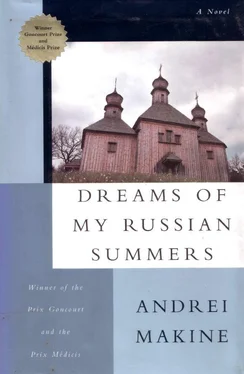The following morning I woke up late. In the next room order had returned… The wind had changed direction and brought the warm breeze from the Caspian. Yesterday's cold weather seemed very remote.
Around midday, without prior agreement, we went out into the steppe. We walked in silence, side by side, skirting round the thickets of the Stalinka. Then we crossed the narrow rails overgrown with wild plants. From afar the Kukushka emitted its whistling call. We saw the little train appear, looking as if it were traveling between tufts of flowers. It drew near, crossed our path, and melted in the heat haze. Charlotte followed it with her eyes, then murmured softly, as she started walking again, "In my childhood I had occasion to take a train that was a bit like a cousin to our Kukushka. This one carried passengers, and with its little carriages it wound its way slowly through Provence. We used to go and stay with an aunt who lived in… I can no longer remember the name of the town. What I do remember is the sun flooding the hillsides; the loud, dry chirruping of the cicadas when we stopped in sleepy little stations. And on those hills, as far as the eye could see, stretched fields of lavender… Yes, the sun, the cicadas, and the intense blue; and the scent that came in through the open windows on the breeze…"
I walked beside her in silence. I sensed that "Kukushka" would henceforth be the first word in our new language. The new language that would say the unsayable.
Two days later I left Saranza. For the first time in my life the silence of the last moments before the train pulled out did not become embarrassing. Through the window I gazed at Charlotte on the platform, amid people gesticulating like deaf-mutes, for fear of not being understood by those departing. Charlotte was silent. Catching my eye, she smiled softly. We had no need of words.
That autumn there were only a few days between the time when, ashamed to admit it to myself, I was rejoicing at my mother's absence – she had gone into hospital, "just for tests" she told us – and the afternoon when, coming out of school, I learned of her death.
The day after she left for the hospital an agreeable lack of constraint became established in our apartment. My father stayed in front of the television till one o'clock in the morning. And I, savoring this prelude to adult freedom, sought to delay my return to the house each day a little longer: nine o'clock, half past nine, then ten o'clock…
I spent these evenings at a crossroads that, in the autumn dusk and with a slight effort of the imagination, created a surprising illusion: that of a rainy evening in a metropolis in the West. It was a unique spot amidst the monotonous broad avenues of our city. The streets that met here branched out like the radii of a circle, leaving the front of each apartment block truncated in the form of a trapezium. I had learned that Napoleon ordered this configuration where streets met in Paris to avoid collisions between carriages…
The denser the darkness, the more complete my illusion became. Knowing that one of these buildings housed the local museum of atheism and the walls of others concealed overcrowded communal apartments – all this hardly troubled me at all. I contemplated the yellow and blue watercolor sketch of windows in the rain, the reflections of the street lamps on the oily asphalt, the silhouettes of the bare trees. I was alone, free. I was happy. Whispering, I talked to myself in French. In front of these trapezium-shaped facades the sound of that language seemed to me very natural. Would the magic I had discovered that summer materialize in some encounter? Each woman who came toward me seemed to want to talk to me. Each extra half hour of night that I gained gave my French mirage more substance. I no longer belonged either to my time or to my country. On this little nocturnal circus I felt wonderfully foreign to myself.
Now the sun wearied me, daytime became a useless waiting period before my true life, the evening…
However, it was in broad daylight, blinded by the glitter of the first hoarfrost, that I learned the news. As I walked past the cheerful crowd of pupils, who still displayed the same disdainful hostility toward me, a voice rang out.
"Have you heard? His mother's dead."
I intercepted several inquisitive glances. I recognized the one who had spoken – the son of one of our neighbors…
It was the lack of concern in the remark that gave me time to grasp the inconceivable situation: my mother was dead. All the events of the past days suddenly fitted together into a coherent picture: my father's frequent absences, his silence, the arrival, two days before, of my sister (although it was not the university vacation time, I now realized)…
It was Charlotte who opened the door to me. She had arrived from Saranza that very morning. So they all knew! While I was "the child we won't say anything to at the moment." And this child, unaware of everything, had continued to pace up and down at his "French" crossroads, imagining himself to be adult, free, mysterious. This sobering thought was the first my mother's death gave rise to. This then gave way to shame: while my mother was dying, I, in selfish contentment, had been reveling in my freedom, recreating the Parisian autumn under the windows of the museum of atheism!
During these sad days and on the day of the funeral Charlotte was the only one who did not weep. Her face impassive, her eyes calm, she saw to all the household tasks, greeted visitors, settled in relatives who came from other towns. Her dry manner displeased people…
"You can come to me whenever you want," she said to me in parting. I nodded my head, picturing Saranza again, the balcony, the suitcase stuffed with old French newspapers. Again I felt ashamed: while we were telling each other stories, life had continued with its real joys and its real sorrows. My mother had gone on working, already ill, suffering without admitting it to anyone, knowing herself to be doomed but never betraying it by word or gesture. And all the while we had spent days on end talking about the elegant ladies of the belle epoque…
It was with concealed relief that I saw Charlotte leave. I felt myself to be covertly implicated in my mother's death. Yes, I bore the vague responsibility for it that a spectator feels when his gaze causes a tightrope walker to stumble or even to fall. It was Charlotte who had taught me to pick out Parisian silhouettes in the midst of a great industrial city on the Volga; it was she who had imprisoned me in this fantasy of the past, from whence I cast absentminded glances at real life.
Real life was the layer of stagnant water that, with a shudder, I had caught sight of at the bottom of the grave on the day of the burial. Under a fine autumn rain, they lowered the coffin slowly into the mixture of water and mud…
Real life also made itself felt with the arrival of my aunt, my father's elder sister. She lived in a workers' district where the population got up at five o'clock in the morning and streamed in to the gates of the gigantic factories in the city. This woman brought with her a ponderous and powerful breath of Russian life – a strange amalgam of cruelty, compassion, drunkenness, anarchy, invincible joie de vivre, tears, willing slavery, stupid obstinacy, and unexpected delicacy… With growing astonishment, I discovered a universe previously eclipsed by Charlotte's France.
My aunt was concerned that my father would take to drinking, a fatal move for the men she had known in her life. Each time she came to see us she repeated, "Whatever you do, Nikolai, keep off the bitter stuff!" That is to say, vodka. He would agree mechanically, without hearing her, then shaking his head energetically, he would declaim: "But it's me who should have died first. That's for sure. With this, you know…"
Читать дальше












